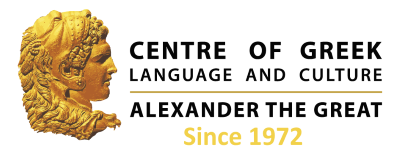The targets that are set in each level are according to what has been defined by the Common European Framework for the teaching and learning of contemporary languages (Common European Framework of Reference for Language Learning and Teaching).
The four skills of producing and comprehending written and oral speech are equally developed in all six levels of knowledge of Modern Greek.
| A1 |
A1 |
beginner |
| A2 |
A2 |
elementary |
| B1 |
B1 |
intermediate |
| B2 |
B2 |
upper intermediate |
| C1 |
Γ1 |
advanced |
| C2 |
Γ2 |
upper advanced |
To find out your level, please fill in the PLACEMENT TEST.
description – targets of levels
| description – targets of levels |
| A1 |
the student can:
- introduction in Greek language – reading & writing
- the student can correspond to introductions, basic dialogues and familiar colloquial expressions
|
| A2 |
the student can:
- give basic information about his personal life and family, about shopping, entertainment etc
- exchange direct information about familiar topics
- comprehend simple public announcements e.g. in means of transport, shops etc
|
| B1 |
the student can:
- produce simple and cohesive speech about topics of personal interest and basic communicational circumstances (e.g. means of transport, workplace, market etc)
- describe personal experiences and facts
- briefly justify his opinions and plans
- comprehend the main points of issues he frequently encounters in places such as work, education etc
- know some of the social and lingual habits of the native speakers (formal-informal style, gestures, handshakes etc)
|
| B2 |
the student can:
- correspond verbally to situations of personal communication and to some specific social or business context
- comprehend the main idea, the gist, but also important details of more complex texts
- talk fluently, without particular effort
- produce more detailed and complex written texts
- present his personal opinion, providing a concurrent explanation and justification
- know the relevant social and lingual habits (formal-informal style, gestures, how to conclude or start a conversation etc)
- be accustomed to the basic characteristics of the Greek mentality and lifestyle, social habits and culture
|
| C1 |
the student can:
- use the Greek language fluently and spontaneously, so as to communicate easily and adequately with the native speakers
- comprehend more demanding and extended texts
- deal with colloquial communicational circumstances, when they change or face a problem
- produce structured and detailed texts, based on complex issues
- act appropriately, according to the social circumstances, and be aware of the various social-cultural differences between his society and the one of the native speakers
|
| C2 |
the student can:
- comprehend anything that he hears or reads, and also identify indirect information from various sources
- communicate totally spontaneously, with ease and precision, develop argumentation on various issues, which arise from any source of oral or written speech, and present with cohesion arguments and references
- use flexibly and efficiently the Greek language for social, academical and business needs
- present a speech that has clarity and structure, using with certainty a variety of lingual mechanisms
|
